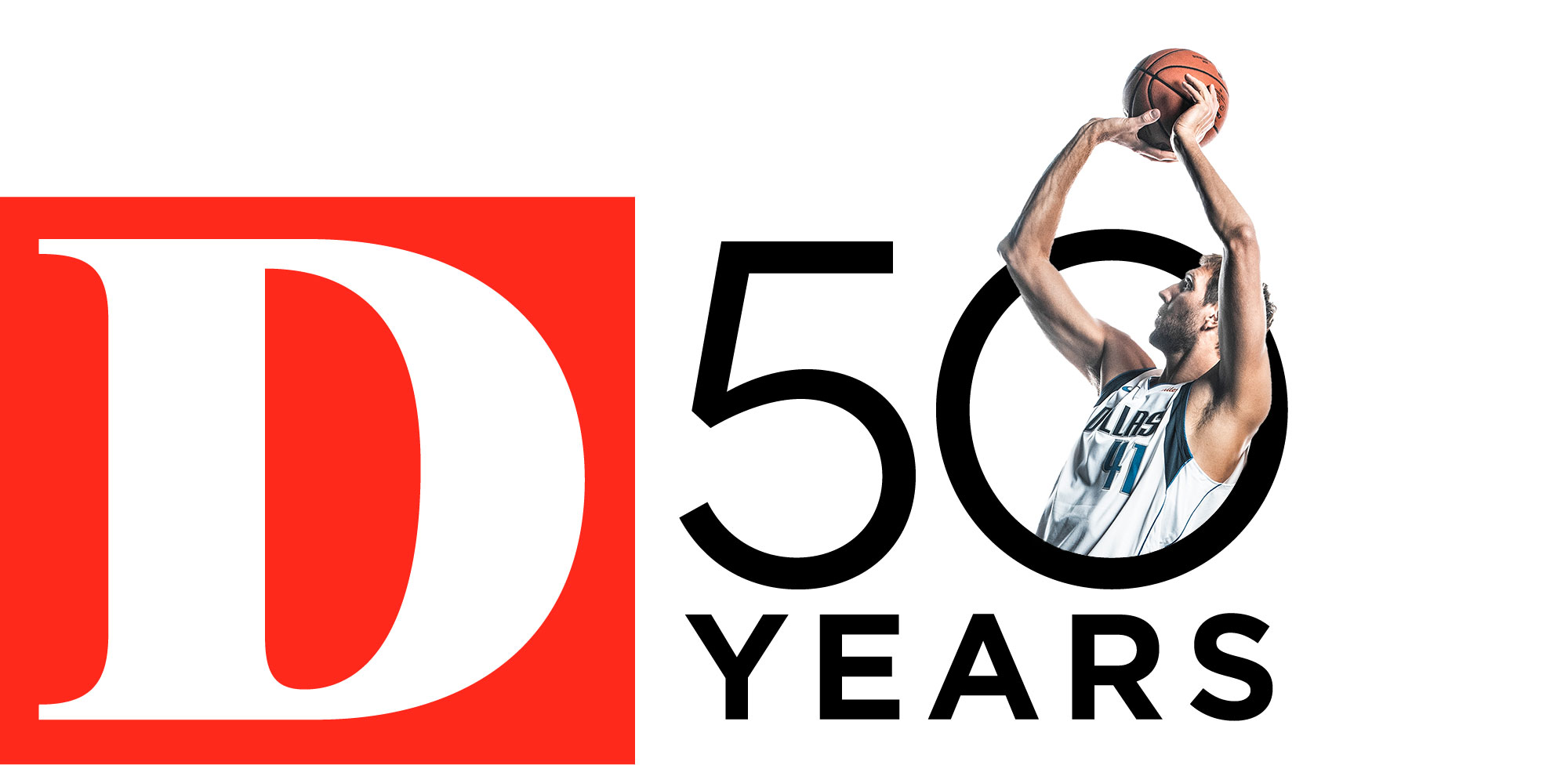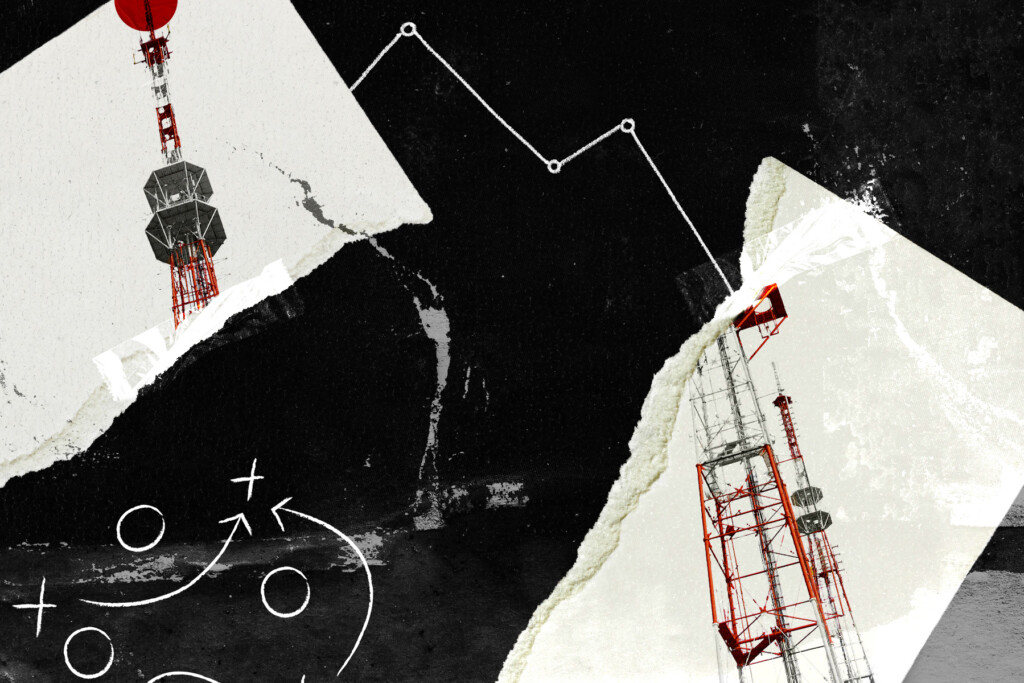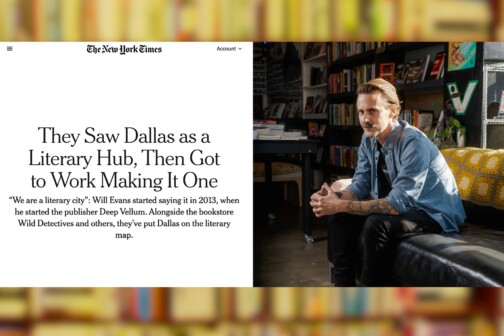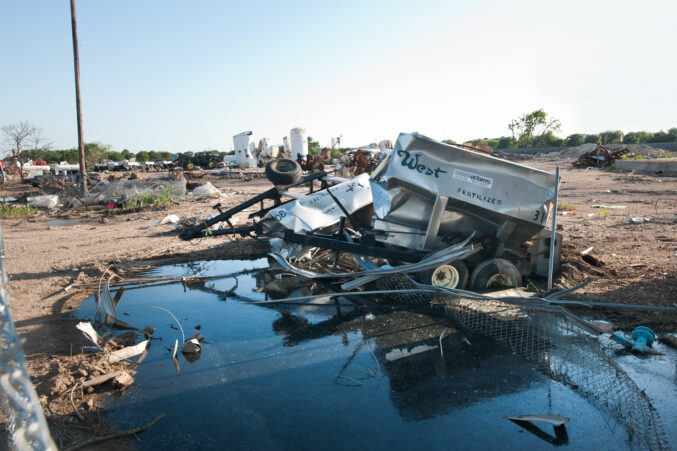Every morning, thousands of sports fans across North Texas share the same soundtrack on their morning commute: sports talk radio.
Some faithfully tune into The Ticket to listen to The Musers, while others head over to The Fan to check out Shan and R.J. For 21 years, a smaller segment tuned into ESPN Radio to hear Mike and Mike in the Morning, and then its successor, Keyshawn, JWill, and Zubin.
That came to an end on March 10.
That morning, everyone who tuned the dial to 103.3 was greeted by something very different: Christian worship.
And as the man coming through the speakers preached about Ecclesiastes instead of errors in baseball, questions inevitably followed.
What had happened to the old third sports station in town: KESN, otherwise known as 103.3 ESPN Radio, the one-time home of Randy Galloway and Ian Fitzsimmons? What doomed the station that made Ben and Skin a Dallas institution, a station that millions tuned into to hear broadcasts of Dallas Mavericks and Texas Rangers games? What unusual business arrangement had been struck to put the station in the hands of a rival? And most importantly, how did the “Worldwide Leader in Sports” lose its presence in the nation’s fifth-largest media market?
ESPN Radio 103.3 launched on April 21, 2001 with a clear directive. Unlike its competition, KESN would be all sports, all the time. The station’s profile was raised two years later. In a market flush with big personalities, the upstart station brought in one of the flashiest by poaching Galloway from WBAP, three years after the city’s most recognizable sports columnist had left the Dallas Morning News for a five-year, $1.5 million contract with the Fort Worth Star-Telegram.
“Then just to make sure that it wasn’t so syndicated that you lost local people, they mixed in local shows,” says Ben Rogers, who joined the station with co-host Jeff “Skin” Wade in 2009.
The addition of KESN was a strategic move by ESPN to have a bigger presence in larger markets. Within the decade, the company launched new sections of ESPN.com geared to regional markets. Local radio hosts and writers covered the cities on a more intimate level, and their takes intermingled with national coverage. ESPN Chicago’s website launched in 2009 to rave reviews, prompting editorial expansion to markets including Los Angeles, New York, Boston, and Dallas. They all fit the mold: a big market with teams in the four major sports, plus a history of success in local radio.
In the beginning, ESPN’s gambit paid off. ESPN Radio ratings increased, moving from a 1.6 ratings share to a 1.8 in early 2009. That put heat on The Ticket, which was fighting to keep Mike Rhyner, the pioneering host of The Hardline, from jumping to The Fan, an upstart looking to make its own splash hire.
Over the next two years, KESN emerged as a force. Media rights played a huge role. In 2010 and ’11, its audience was treated to the Rangers making back-to-back World Series appearances plus the Mavericks capturing the NBA championship. A pair of radio hosts were also on the rise, and in a span of four years, they would become the station’s biggest success story—and a harbinger of its downfall.
Rogers and Wade, both Richardson natives, burst onto the North Texas radio scene as KESN was on the come-up. Their first break came in 2001, when they hosted a two-minute Mavericks pregame show on The Ticket. They parlayed that into leading the postgame show, too, along with weekend fill-in spots on The Ticket. In 2008, seven years after the debut of those pregame shows, they moved to The Fan and were given their own show.
A year later, the Homegrown Home Boys moved to KESN—just as professional teams in North Texas were experiencing one of their best stretches ever. As two of Dallas’ biggest teams climbed the ladder to championship contenders, the careers of Rogers and Wade surged right along with them.
“That was where our career became real,” Wade says. “There was so much interest in what was going on with the Rangers and Mavs, and we were in the middle of it.” That was especially true during the Mavericks’ 2011 championship run. The pair was on the road with the team throughout the playoffs, and Wade carved out a role he still holds on the Bally Sports Southwest (then Fox Sports Southwest) broadcast team with Mark Followill and Derek Harper.
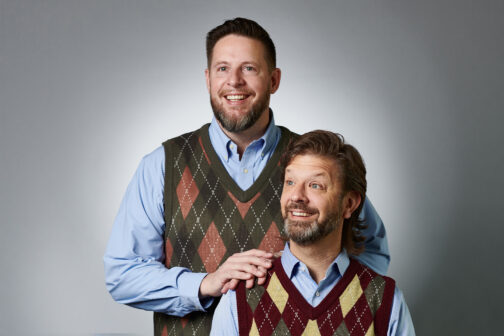
The ride came to an inauspicious stop when their contracts expired in February 2013. Toward the end of the deal, the pair entered into negotiations with KESN on a long-term agreement.
It made all the sense in the world. Four years after its debut, The Ben and Skin Show was one of ESPN Radio’s flagship shows in the market. The duo steadily gained traction in the market through their “Grow the Show” campaign, even making appearances on Fox Sports Southwest during Rangers games to add color to the broadcasts. Why wouldn’t KESN want to lock the two up?
Instead, the station’s best offer was a six-month deal.
“We were like, Why would we sign a six-month contract?” Wade says. “That is either an indication that you don’t want us long-term or something else.”
The negotiations became a story around town, so much so that on February 22, Mavericks owner Mark Cuban spent part of his guest appearance on the show calling out the ESPN brass for not offering a fair deal.
It would be Ben and Skin’s last broadcast on the station. Cuban was the final guest.
Three months later, Ben and Skin were back at The Fan, a move that energized Dallas’ third-place sports station at the expense of its second.
“It built some buzz,” says Kevin Hageland, co-host of The K&C Masterpiece, The Fan’s midday show. “I know people to this day who say, ‘I started listening to your station because of Ben and Skin.’”
The reason KESN low-balled Ben and Skin became obvious five months later. In early August, Galloway was summoned to meet with five ESPN executives, who had flown in from the company’s headquarters in Bristol, Connecticut. During that meeting, Galloway learned ESPN had entered into a local marketing agreement, or an LMA, with Cumulus, which operated rival station The Ticket. ESPN had effectively leased out its station to its primary competitor.
On the surface, it was a bizarre move. But there was plenty of precedent for it. LMAs came to prominence in the early 1990s, when companies were only allowed to own one AM and one FM station per market and 12 stations nationally. LMAs enabled companies to circumvent those regulations and expand into other radio genres. But they still had their uses after the rules loosened when the Telecommunications Act of 1996 was passed. Per multiple sources, the prevailing theory is that ESPN wanted out of the direct management of radio stations, and the LMA allowed the network to maintain a station in Dallas for its national programming without having to operate it.
Galloway had been called in to be convinced to sell the agreement to his colleagues. Getting the station’s most valuable asset on board would go a long way toward quelling fears within KESN. He immediately shot down any hopes of that.
“You just sold us to the Taliban!” Galloway recalls shouting at the top ESPN executive in the room.
With the LMA going into effect two months later, Galloway exercised what he refers to as his “golden parachute,” an opt-out that allowed him to be paid the remainder of his contract, which had two and a half months left on it, if the station were sold or managed by another company. The biggest name at the station was gone before Cumulus had presided over a single broadcast.
A new dynamic began to form. ESPN Radio was relocated from its space in Las Colinas into The Ticket’s Dallas office, and its employees reported to Jeff Catlin, program director at The Ticket, and Dan Bennett, a regional vice president at Cumulus. Matt Mosley, who was promoted to Galloway’s old spot after serving as his co-host on Galloway & Company, says the relationship was tense from the beginning.
Space was one concern: the building was too cramped to accommodate another station, leaving the ESPN crew to broadcast from a studio Mosley described as “basically a broom closet.” The relationship between KESN employees and the higher-ups—Bennett and Cumulus co-founders (and Atlanta-based brothers) Lew and John Dickey—was also strained. “Bennett used to have me in his office before the show to tell me I was making too much money,” Mosley says. “For this reason, I tried to avoid bumping into him.”
So it went for two years. Then the hits started coming. Fitzsimmons left in 2015 and created a national ESPN Radio show a year later with Freddie Coleman. A far bigger and more crippling departure came later in that year. After four years on KESN, the Rangers opted not to renew their agreement with the station, signing instead with The Fan. According to multiple sources, Cumulus and the Dickey brothers were blindsided by the decision.
“Two cocky dudes in Atlanta [the Dickey brothers] feel like they got it on lock, and they don’t know the lay of the land,” Wade says.
(When reached by email, John Dickey declined to comment for this story, telling D Magazine, “Unfortunately, this event (LMA of KESN) was almost 10 years ago and I honestly don’t recall the details around this deal.”)
In the aftermath, things got personal, and Rangers pre- and post-game host Mike Peasley got caught in the crossfire. Peasley had acquitted himself well during his two years on the broadcast and also became the designated fill-in for legendary play-by-play man Eric Nadel whenever the National Baseball Hall of Famer took time off. It was a dream job.
“What kid doesn’t dream of getting the chance to do play-by-play for the Rangers?” Peasley says.
But Peasley’s contract was with KESN, not the Rangers. And when the club made overtures to take him along to The Fan, Cumulus—specifically, Bennett, according to multiple sources—blocked the move by exercising a one-year option in his contract that blocked him from leaving to join Nadel, who is an employee of the team.
Being let out of a contract in the world of radio is not unheard of. Rogers and Wade had been freed of their initial contract at The Fan to bring The Ben and Skin Show to KESN after begging CBS Radio for their release. Sources speculated that Bennett blocked the move in retaliation for the Rangers’ contentious departure.
Two cocky dudes in Atlanta [the Dickey brothers] feel like they got it on lock, and they don’t know the lay of the land.
Jeff “Skin” Wade on the Rangers’ departure from KESN
Peasley called being blocked from changing stations “easily the worst thing” in his professional career. Seven years later, a number of his co-workers are still rankled by it.
“Bennett was so pissed that the Rangers were leaving ESPN Dallas and going to the Fan, that to spite the Rangers, he refused to allow Mike Peasley, who has two kids, to leave ESPN Dallas and go with the Rangers,” Fitzsimmons says.
(Citing Cumulus policy, Bennett declined to comment for this story, telling D Magazine, “While we operated it for a period of time, I am not at liberty to make any comment on a property that is not ours.”)
Ratings declined over the ensuing years; almost no one from the station’s heyday stayed on the air. Dennis and Cowlishaw was seventh in its afternoon drive-time slot, beating the 11th-place Ben and Skin at The Fan. But outside of that, there was little to celebrate. Less than a decade after KESN was nipping at The Ticket’s heels, the station slid to third in sports talk in 2017. It plummeted to 17th overall in the coveted 25-to-54 demographic, with The Fan resting in 10th place and The Ticket firmly in the lead.
Three years later, in the summer of 2020, KESN remained stuck well behind the competition with a 2.1 share. Changes were on the horizon.
The LMA that gave full control of KESN to Cumulus was scheduled to expire in October 2020. ESPN was again in charge of a station it had no interest in running.
It acted accordingly. On August 14, ESPN executives announced in a Zoom call that the station would revert to national content only. Aside from Mavericks radio play-by-play man Chuck Cooperstein, every personality would be let go.
“There were people, 20 minutes later, who had to go on the air and be professional as if nothing had happened,” Cooperstein recalls, “and yet their entire life had just been turned upside down.”
Six weeks later, the station consisted of national programming interrupted by Mavericks broadcasts. And before the 2021-22 season tipped off, the Mavs were gone, too, as the expiration of the LMA enabled Cuban to opt out of the team’s broadcast agreement two years early. (The team landed at 97.1 The Eagle, Ben and Skin’s newest home, before the station shifted formats and rebranded as The Freak in September 2022.) The maneuver called to mind Galloway’s departure in 2013, in how the relationship was severed, and how it marked the end of an era at ESPN.
This time it was the end. With no local ties, KESN was sold to Milwaukee-based VCY America in December 2021 for the bargain price of $9.2 million. That left Dallas without a radio affiliation to ESPN, which holds the broadcast rights to the World Series, the College Football Playoff, and the NBA Finals.
It also cut one of the nation’s first three-station sports radio markets back to two. The journalists who dominated the KESN airwaves are gone, from Galloway to Mosley to Fitzsimmons, and the remaining stations have moved firmly away from that model.
But ESPN Radio still left a legacy behind. It was a place where, rain or shine, no matter the hour, listeners could tune in and know that they’d hear sports talk on the radio. Perhaps there’s a place for that again someday. Until then, the closest anyone who flicks on 103.3 during that rush hour drive to the office will get to the old days is a little Ecclesiastes.
An earlier version of this story incorrectly stated that Randy Galloway joined ESPN Radio upon its launch in 2001 and that the Rangers left ESPN Radio in 2016.
